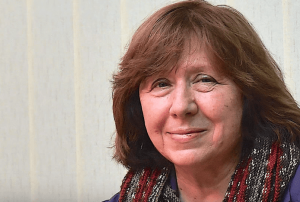Learn All about Svetlana Alexievich

Most people had never heard of Svetlana Alexievich until 2015 when she won the Nobel Prize in Literature. It was the first time in history that a journalist won this award for investigative, non-fiction writing.
Until that point, only poets and fiction authors had won the prize. Svetlana Alexievich’s work, however, is inspired by real people and events. She captured the reality of the Soviet world and her own country, Belarus, better than anyone.
“But I don’t just record a dry history of events and facts, I’m writing a history of human feelings.”
-Svetlana Alexievich-
Her most famous book, Voices from Chernobyl, has been translated into twenty languages. However, no one in Alexievich’s home country can read the book because the government banned it. That fact alone gives you an idea of how important this great contemporary writer is.

Echoes of Childhood
Svetlana Alexievich was born accidentally in a Ukrainian town called Stanislav. We say accidentally because her father, a member of the Belarusian military, was temporarily assigned there. Alexievich spent her childhood and a good part of her adult life in Stanislav.
Stanislav itself tells a story of instability. It was part of the Austro-Hungarian Empire, Western Ukraine, Poland, the Soviet Union, Germany, and finally Belarus. Stanislav doesn’t even exist anymore. Now, it’s a town called Ivano-Frankivsk.
Alexievich was born on May 31st, 1948. Her mother was a rural teacher, as well as her father (in addition to being in the military). Political instability marked her childhood and youth. Later, she studied journalism at the Belarusian State University.
Svetlana Alexievich: An Audacious Reporter
A notable Soviet writer named Ales Adamovich is one of Alexievich’s greatest inspirations. He was one of the writers who developed a new genre he called “novel-evidence”, “collective novel”, “epic chorus”, or “novel-oratorio”. The genre is a hybrid between journalism and literature.
After working for a few newspapers, Alexievich started to work on deeper projects. She became a tireless traveler, crossing borders for testimonials from survivors of big historical events. That’s when she started to write excellent reports.
In 1985, she published her first book, The Unwomanly Face of War. It contained numerous interviews of women who lived through World War II. The newspaper she was working for when the book came out fired her and accused her of disgracing the national honor of the Soviets.
A Brave Woman
In 1989, Svetlana Alexievich published Zinky Boys after conducting 500 interviews. The people she interviewed had participated in the Soviet invasion of Afghanistan. In her book, she denounces many cases of human rights violations. As a consequence of her actions, the authorities forced her to appear in court.
Her outspoken criticism of the Soviet Union led her to seek politic refuge in 1991. Since then, she has lived in different European countries.
In 1997, Alexievich published Voices from Chernobyl, which is her masterpiece. In this book, she shares testimonies from the Chernobyl nuclear disaster victims. It took her about 10 years to collect all the material for the book. Her work brought to light the serious mistakes the authorities made during the disaster.

Disappointment and Glory
Svetlana Alexievich’s writing explores human drama and its consequences. Her work is moving because she’s able to communicate the profound paradoxes of great historical moments, particularly those related to the Soviet Union.
These events have directly affected Alexievich – she herself is a victim of war and turmoil. When she was a girl, her parents fled from the war. As an adult, the Chernobyl disaster left her mother blind and killed her sister. She also suffers from the grief of exile and the impossibility of returning to her home country.
Alexievich has received many prizes for her work over the course of her career. As we mentioned above, she’s the first (and so far the only) non-fiction writer to receive the Nobel Prize. Today, she continues to write and try to understand human evil and goodness.
Most people had never heard of Svetlana Alexievich until 2015 when she won the Nobel Prize in Literature. It was the first time in history that a journalist won this award for investigative, non-fiction writing.
Until that point, only poets and fiction authors had won the prize. Svetlana Alexievich’s work, however, is inspired by real people and events. She captured the reality of the Soviet world and her own country, Belarus, better than anyone.
“But I don’t just record a dry history of events and facts, I’m writing a history of human feelings.”
-Svetlana Alexievich-
Her most famous book, Voices from Chernobyl, has been translated into twenty languages. However, no one in Alexievich’s home country can read the book because the government banned it. That fact alone gives you an idea of how important this great contemporary writer is.

Echoes of Childhood
Svetlana Alexievich was born accidentally in a Ukrainian town called Stanislav. We say accidentally because her father, a member of the Belarusian military, was temporarily assigned there. Alexievich spent her childhood and a good part of her adult life in Stanislav.
Stanislav itself tells a story of instability. It was part of the Austro-Hungarian Empire, Western Ukraine, Poland, the Soviet Union, Germany, and finally Belarus. Stanislav doesn’t even exist anymore. Now, it’s a town called Ivano-Frankivsk.
Alexievich was born on May 31st, 1948. Her mother was a rural teacher, as well as her father (in addition to being in the military). Political instability marked her childhood and youth. Later, she studied journalism at the Belarusian State University.
Svetlana Alexievich: An Audacious Reporter
A notable Soviet writer named Ales Adamovich is one of Alexievich’s greatest inspirations. He was one of the writers who developed a new genre he called “novel-evidence”, “collective novel”, “epic chorus”, or “novel-oratorio”. The genre is a hybrid between journalism and literature.
After working for a few newspapers, Alexievich started to work on deeper projects. She became a tireless traveler, crossing borders for testimonials from survivors of big historical events. That’s when she started to write excellent reports.
In 1985, she published her first book, The Unwomanly Face of War. It contained numerous interviews of women who lived through World War II. The newspaper she was working for when the book came out fired her and accused her of disgracing the national honor of the Soviets.
A Brave Woman
In 1989, Svetlana Alexievich published Zinky Boys after conducting 500 interviews. The people she interviewed had participated in the Soviet invasion of Afghanistan. In her book, she denounces many cases of human rights violations. As a consequence of her actions, the authorities forced her to appear in court.
Her outspoken criticism of the Soviet Union led her to seek politic refuge in 1991. Since then, she has lived in different European countries.
In 1997, Alexievich published Voices from Chernobyl, which is her masterpiece. In this book, she shares testimonies from the Chernobyl nuclear disaster victims. It took her about 10 years to collect all the material for the book. Her work brought to light the serious mistakes the authorities made during the disaster.

Disappointment and Glory
Svetlana Alexievich’s writing explores human drama and its consequences. Her work is moving because she’s able to communicate the profound paradoxes of great historical moments, particularly those related to the Soviet Union.
These events have directly affected Alexievich – she herself is a victim of war and turmoil. When she was a girl, her parents fled from the war. As an adult, the Chernobyl disaster left her mother blind and killed her sister. She also suffers from the grief of exile and the impossibility of returning to her home country.
Alexievich has received many prizes for her work over the course of her career. As we mentioned above, she’s the first (and so far the only) non-fiction writer to receive the Nobel Prize. Today, she continues to write and try to understand human evil and goodness.
All cited sources were thoroughly reviewed by our team to ensure their quality, reliability, currency, and validity. The bibliography of this article was considered reliable and of academic or scientific accuracy.
- Ánjel, M. (2015). Sobre Svetlana Alexievich. Antes de todo, la memoria (O de cómo una periodista rusa (¿ucraniana?) atrapa lo que no se quiere decir y es imposible de olvidar). Comunicación, (33), 83-91.
This text is provided for informational purposes only and does not replace consultation with a professional. If in doubt, consult your specialist.







